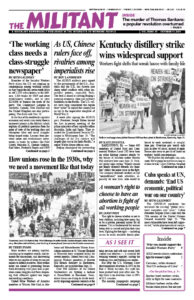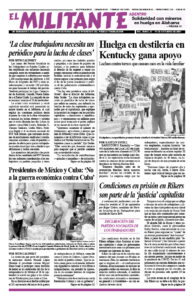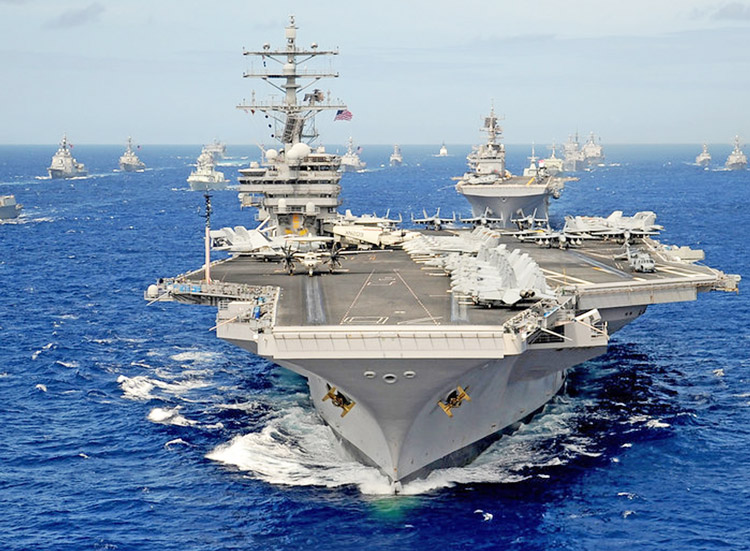The AUKUS military pact signed by the governments of the U.S., Australia and the U.K. has thrown into sharp relief conflicts with other imperialist powers, especially Paris. The deal is aimed at curbing Beijing’s growing economic clout and military ambitions in the Pacific. The U.S. rulers have long considered the region their “prize” to exploit for coming out on top in the imperialist slaughter of World War II.
A week after signing the AUKUS pact, President Joseph Biden hosted the first in-person meeting of the prime ministers of key capitalist allies Australia, India and Japan. They attended the Quadrilateral Security Dialogue in Washington Sept. 24. “The challenges of the 21st century will largely play out in the Indo-Pacific,” a senior White House official said.
Beijing denounced the partnership and growing alliances against it as “doomed to fail.”
To advance their interests in the Indo-Pacific, the U.S. rulers need allies. Contrary to their illusions, they did not emerge victorious from the Cold War after the collapse of the Stalinist regimes in the Soviet Union and Eastern Europe, which had helped to crush revolutionary struggles worldwide in hopes of “detente” with Washington. U.S. imperialism now finds itself in a world without the same buffers to rely on, forced to confront workers and toilers everywhere with the threat of military intervention.
Unable to impose its authority in wars in the Middle East and Afghanistan, Washington now faces sharpening competition from imperialist rivals, alongside the rapid rise of Beijing.
The AUKUS pact centers on a plan to build eight nuclear-powered submarines in Australia to strengthen the military armada facing Beijing. A week after the deal was unveiled, U.S. aerospace giant Boeing announced plans to build an Australian-designed military drone near Toowoomba in Queensland. The Loyal Wingman will use artificial intelligence to fly in tandem with manned aircraft.
Deepening relations with, and dependence on, Washington, the world’s dominant imperialist power, are at the heart of the foreign policy decisions of the governments of Australia and the U.K.
Imperialist rifts widen
Most of the capitalist powers in the European Union see Washington as a rival, even though they depend upon U.S. military might for their own defense.
As part of the signing of the AUKUS pact, the Australian government scrapped a 2016 contract with Paris to build 12 French-designed conventionally powered submarines. In protest, the French government withdrew its ambassadors to Washington and Canberra while suspending high-level meetings.
The French rulers planned to use their multibillion-dollar contract with Canberra to boost their military presence in the Indo-Pacific, where they hold colonies, including New Caledonia and French Polynesia. That plan is now in tatters.
Paris has reverted to calls for “European strategic autonomy,” hoping to persuade other governments in Europe to build up their own military forces and to depend less on Washington. French officials accused the U.K. government of being a “vassal state” of Washington.
In fact, the rulers in France and Germany were weakened as London quit the EU. The bloc continues to be torn apart by the competing interests of its various national ruling classes. Paris received only lukewarm support within the EU when it urged the bloc to halt talks with the Australian government over trade in the wake of the AUKUS pact.
London hopes to use its historic connections with the U.S. and Australian rulers to deepen military and economic collaboration with them. Having signed a trade deal with Canberra, it continues to seek one with Washington.
Despite the German rulers’ position as the most dominant economic force in the EU, German politicians said little about the signing of the AUKUS pact. The German press criticized the French government for its response to the deal. Rivalry between Berlin and Paris is at the center of conflicts within the EU.
“The European Union is far from being taken seriously in a security partnership beyond its own continent,” noted the Berlin Der Tagesspiegel.
For years the German rulers have tried to advance their place in the world imperialist pecking order by using the EU to squeeze the weaker nations in southern Europe. They act under the illusion that they can compete without reinforcing their own military power as tensions with rivals mount. Berlin is dependent on the presence of U.S. forces based in Germany under the NATO pact.
Rifts between Washington and Berlin sharpened after the German government joined with Moscow to build the Nord Stream 2 pipeline between the two countries, making Berlin dependent on the Russian rulers for supplying half of its economy’s natural gas. That dependency is likely to rise as coal and nuclear power are phased out by the German government.
Only days after the AUKUS announcement, both the Chinese and Taiwanese rulers made rival bids to join the Trans-Pacific Partnership. The administration of Donald Trump withdrew Washington from that Pacific-rim trade deal set up by the Barack Obama administration to try to hinder Beijing’s growing influence in the region.
Since then the 11-state pact has been revived at the initiative of the Japanese government. It includes the governments of Australia and Canada. Under its rules existing members have veto power over new members.
Beijing claims self-ruling Taiwan as part of its territory and has threatened military action to back up its claim. Some governments fear economic reprisals by Beijing if it is refused entry or if Taiwan is allowed to join.
“The working class needs its own foreign policy,” Róger Calero, Socialist Workers Party candidate for New York mayor, told the Militant. “The capitalist rulers’ foreign policy defends their class interests — their exploitation of workers and farmers, here and overseas. Our foreign policy starts with solidarity with working people in their struggles for better conditions — from China to Mexico and around the world.”


